#American Airlines Group
Text
</3
#no wait listen to me. listen to me#im south asian. my grandparents were muslim. my great aunt and uncle and their children and my parents siblings are all muslim#my parents aren't. they raised us without any religion. without even our national cultural ceremonies tied to islam#dont let yourself believe for a fucking second that has nothing to do 9/11 happening two years before i was born. two years before we moved#im south asian. my dad's first name is mohammed. when we catch a flight we get to the airport two hours earlier-#to account for the time it'll take my dad to be 'routinely stopped and searched' by airport security#routinely is right lmfao. it happens every time we fly#last time i was on an american airlines flight our checked luggage ended up across the continent and took two days to get to us#(my 12yo cousin gifted us an alarm clock that made an ominous ticking noise and we couldn't shut it the fuck up-#the luggage was labeled mohammed and coming from south asia. my sibling jokes it's a wonder we got it back)#im canadian. i cried my ass off to cfa tonight bc of how touching the story of a small town coming together to help a group of strangers is#(can't help thinking that never would've happened in a bigger city? but thereby lies another tale)#and god normally i hate 9/11 stories bc it feels like two sides of my identity being pitted against each other and it makes me so uncomfy#like as a canadian i should be sympathetic towards the states and at the same time im viscerally aware of the lasting prejudiced impacts#but cfa did it so beautifully#will never get over the 'thorough search' scene. 'you will never understand'.#the lump in my throat i get every time I watch my normally distinguished and tough and coolheaded father be pushed through airport security#how resigned he is to it. how he tries to stay dignified. how scared my mom gets every time. how rough they are with him#when he usually commands respect#and yet also the pride and the lump in my throat i got today knowing it was a little canadian town that made a difference#sigh enough out of me i just have a lot of feelings#come from away#team screams
9 notes
·
View notes
Text
This Week In The Markets: Earnings, Housing Data, And Bitcoin Halving

@GoldmanSachs/twitter.com
Bitcoin Halving: Expected on or before Saturday, April 20th. This could impact cryptocurrency prices.
Earnings Season Continues: Reports from major companies including Goldman Sachs (GS), Netflix (NFLX), American Express (AXP), and Procter & Gamble (PG).
Federal Reserve Commentary: Speeches from several Fed officials throughout the week.
Economic Data: Housing starts, retail sales, industrial production, and jobless claims reports.
Monday, April 15th:
Manufacturing data: Empire State Manufacturing Survey.
Consumer spending: U.S. retail sales Business inventories report.
Housing market sentiment: Homebuilder confidence.
Fed speakers: Dallas Fed President Procter & Gamble and San Francisco Fed President Mary Daly.
Company earnings: Goldman Sachs, Charles Schwab, and M&T Bank.
Tuesday, April 16th:
Housing data: Housing starts and building permits Industrial production and capacity utilization reports.
Company earnings: UnitedHealth Group, Johnson & Johnson, Bank of America, Morgan Stanley, BNY Mellon, and PNC Bank.
Wednesday, April 17th:
Mortgage applications data.
Federal Reserve.
Beige Book release.
Company earnings: United Airlines, Abbott Laboratories, U.S. Bancorp, Travelers, Citizens Financial, First Horizon, and Discover Financial Services.
Thursday, April 18th:
Jobless claims report.
Manufacturing data: Philadelphia Fed manufacturing survey.
Existing home sales data.
Leading economic indicators report.
Fed speakers: New York Fed President John Williams and Atlanta Fed President Raphael Bostic.
Company earnings: Netflix, Intuitive Surgical, and Infosys.
Friday, April 19th:
Fed speaker: Chicago Fed President Austan Goolsbee.
Company earnings: Procter & Gamble, American Express, Fifth Third Bancorp, and Huntington Bancshares.
Disclaimer:
This information is provided for informational purposes only and should not be considered investment advice. Please consult with a financial professional before making any investment decisions.
#new york#new york city#manhattan#nyc#john williams#Raphael Bostic#Austan Goolsbee#Netflix#Intuitive Surgical#infosys#Procter & Gamble#American Express#Fifth Third Bancorp#Huntington Bancshares#UnitedHealth Group#Goldman Sachs#Mary Daly#United Airlines#Abbott Laboratories#U.S. Bancorp#Travelers#Citizens Financial#First Horizon#Discover Financial Services
0 notes
Text
Stock market today: Live updates
Traders work on the floor of the New York Stock Exchange (NYSE) in New York City, July 19, 2023.
Brendan McDermid | Reuters
Nasdaq 100 futures slipped Wednesday evening after Netflix posted its latest quarterly results.
Nasdaq 100 futures dipped 0.41%. S&P 500 futures slipped 0.14%, while Dow futures hovered near the flat line.
Shares of Netflix dropped 8% in after-hours action after the…
View On WordPress
#American Airlines Group Inc#Blackstone Inc#Breaking News: Markets#business news#Dow Jones Fut (Mar&x27;23)#Dow Jones Industrial Average#Economic events#Johnson & Johnson#Markets#NASDAQ 100 Fut (Mar&x27;23)#NASDAQ Composite#Netflix Inc#S&P 500 Fut (Mar&x27;23)#S&P 500 Index#Tesla Inc#Travelers Companies Inc
0 notes
Text
United Airlines (UAL) earnings Q4 2022
United Airways‘ fourth-quarter revenue and outlook for early 2023 topped Wall Avenue estimates due to sturdy journey demand and excessive fares.
Shoppers’ urge for food for air journey and willingness to pay increased fares has helped airways return to profitability regardless of increased prices for gas, labor, and different bills tied to ramping their networks again up. In the meantime, plane…

View On WordPress
#Aerospace and defense industry#Airlines#American Airlines Group Inc#Breaking News: Business#Business#business news#Delta Air Lines Inc#Earnings#Life#Markets#Politics#Southwest Airlines Co#Transportation#Travel#United Airlines Holdings Inc
0 notes
Text
Boeing's last 747 has rolled out of the factory after a more than 50-year production run
Boeing’s last 747 has rolled out of the factory after a more than 50-year production run
Boeing’s last 747 aircraft, #1574, at its factory in Everett, Washington.
Leslie Josephs | CNBC
EVERETT, Wash. − Boeing‘s final 747 rolled out of the company’s cavernous factory north of Seattle Tuesday night as airlines’ push for more fuel-efficient planes ends the more than half-century production run of the jumbo jet.
The 1,574th — and last — 747 will later be flown by a Boeing test pilot,…

View On WordPress
#Aerospace and defense industry#Airlines#American Airlines Group Inc#Atlas Air Worldwide Holdings Inc#Boeing Co#Breaking News: Business#business#Business news#Life#politics#Trade#Transportation#travel
0 notes
Text
Boeing's last 747 has rolled out of the factory after a more than 50-year production run
Boeing’s last 747 has rolled out of the factory after a more than 50-year production run
Boeing’s last 747 aircraft, #1574, at its factory in Everett, Washington.
Leslie Josephs | CNBC
EVERETT, Wash. − Boeing‘s final 747 rolled out of the company’s cavernous factory north of Seattle Tuesday night as airlines’ push for more fuel-efficient planes ends the more than half-century production run of the jumbo jet.
The 1,574th — and last — 747 will later be flown by a Boeing test pilot,…

View On WordPress
#Aerospace and defense industry#Airlines#American Airlines Group Inc#Atlas Air Worldwide Holdings Inc#Boeing Co#Breaking News: Business#business#business news#Life#Politics#Trade#Transportation#Travel
0 notes
Text
Delta invests in electric air taxi startup Joby, plans last-mile airport service
Delta invests in electric air taxi startup Joby, plans last-mile airport service
A Joby Aviation Electric Vertical Take-Off and Landing (eVTOL) aircraft outside the New York Stock Exchange (NYSE) during the company’s initial public offering in New York, U.S., on Aug. 11, 2021.
Michael Nagle | Bloomberg | Getty Images
Delta Air Lines, which has watched competitors map future plans with electric vertical takeoff and landing aircraft startups, is joining the growing list of…
View On WordPress
#Airlines#American Airlines Group Inc#Asia News#business news#Climate#Delta Air Lines Inc#Transportation#travel#United Airlines Holdings Inc
0 notes
Text
Why Millennials aren’t leaving Tiktok

I'm on tour with my new, nationally bestselling novel The Bezzle! Catch me TOMORROW NIGHT (Mar 22) in TORONTO, then SUNDAY (Mar 24) with LAURA POITRAS in NYC, then Anaheim, and more!

The news that Gen Z users have abandoned Tiktok in such numbers that the median Tiktoker is a Millennial (or someone even older) prompted commentators to dunk on Tiktok as uncool by dint of having lost its youthful sheen:
https://www.garbageday.email/p/tiktok-millennials-turns
But "why are Gen Z kids leaving Tiktok?" is the wrong question. The right question is, why aren't Millennials leaving Tiktok? After all, we are living through the enshittocene, the great enshittening, in which every platform gets monotonically, irreversibly worse over time, and Tiktok is no exception:
https://pluralistic.net/2023/01/21/potemkin-ai/#hey-guys
To understand why older users are stuck to Tiktok, we need to start with why younger users relentlessly seek out new platforms. To some extent, it's just down to youth's appetite for novelty, but that's only part of the story. To really understand why people come to – and leave – platforms, you have to understand switching costs.
"Switching costs" is the economists' term for everything you have to give up when you change products or services. Switching from Ios to Android probably means giving up a bunch of your apps and purchased media. Switching from an airline where you're a high-status frequent flier to another carrier means giving up on free checked bags and early boarding.
In an open market, rivals have lots of ways to lower these switching costs (it's an open secret that you can call an airline and say, "Hi, I'm a 33rd Order Mason on American Airlines, will you make me a Triple Platinum Diamond Sky-Baron if I switch to Delta?"). Of course, big incumbents hate this, and do everything they can to increase their switching costs, finding ways to impose high switching costs that punish disloyal consumers who have the temerity to go elsewhere.
With social media, lock-in comes for free, thanks to the "collective action problem." Getting people to agree on a given course of action is hard, and as you add more people to the picture, the problem gets harder. It's hard enough to get half a dozen people in your group-chat to agree on where to go for dinner or what board-game to play. But once you're reliant on a social media service to stay in touch with friends, relatives around the world, customers, communities (say, rare disease support groups), and coordination (like organizing your kid's little league car-pool), the problem becomes nearly insoluble. Maybe you can convince your overseas relatives to switch to a Signal group, but can you do the same for your small business's customers, or your old high-school pals?
https://pluralistic.net/2022/10/29/how-to-leave-dying-social-media-platforms/
Taken together, switching costs and collective action problems make platforms "sticky," and sticky platforms inevitably enshittify.
Platforms, after all, generate value. They connect end-users with each other (say, little league parents) and they connect end-users to business customers (you and your small business's customers). That value needs to be parceled out among end users, business customers, and the platform's shareholders. A platform can make life better for business customers at its end users' expense by increasing the number of ads (hello, Youtube!), and it can make life better for its shareholders at its business customers' expense by decreasing the share of ad revenue given to publishers or performers (oh, hello again, Youtube!).
From a platform's perspective, the ideal state is one in which end users and business customers get no value from the platform, because it's all being captured by the platform's shareholders. But if Youtube interrupted every 30 seconds of video for ten minutes of ads and paid the video creators nothing, both users and creators would ditch the platform – and advertisers would follow:
https://www.youtube.com/watch?v=Dab8sKg8Ko8
So platforms seek an equilibrium: "what is the least value we apportion to end-users and business customers without triggering their departure?" Maybe that means giving more value to end-users (for example, keeping Uber fares low by suppressing wages), or to business-customers (crowding more ads into your social media feed).
Every business – including brick-and-mortar, non-digitized ones – wants to find some kind of equilibrium between the value going to its suppliers, its customers and its owners, but digital businesses have an advantage here: digital systems are flexible in ways that analog, hard-goods businesses are not. Digital businesses can alter pricing, payouts and other dynamics from moment to moment – second to second – and make a different offer to every supplier and customer. They have a bunch of knobs, and they can twiddle them at will:
https://pluralistic.net/2023/02/19/twiddler/
Well, not quite at will. Businesses face constraints on their twiddling. If they get too greedy, users or business customers might weigh the cost of staying against the switching costs and decide it's not worth it. But the more expensive – the more painful – a platform can make leaving, the more pain they can inflict on the people who stay.
In other words, there's two ways to keep a customer or supplier's business: you can make a better service so they won't want to leave, or you can make leaving the service so painful that they stay even if you mistreat them.
There's three ways a digital company can make things worse for their customers and users without losing their business.
First, they can eliminate competition (think of Mark Zuckerberg buying Instagram to recapture the users who'd fled Facebook to escape his poor management):
https://pluralistic.net/2023/09/03/big-tech-cant-stop-telling-on-itself/
Second, they can capture their regulators and avoid punishment for trampling their suppliers' or users' legal rights (think of how Amazon has raised the price of everything we buy, both on- and off Amazon, through its "most favored nation" deals):
https://pluralistic.net/2023/04/25/greedflation/#commissar-bezos
Third, they can use IP law to prevent competitors from modifying their services to claw back some of that value (think of how Apple used legal threats to block an Android version of Imessage, blocking Apple customers from having private conversations that included non-Apple customers:
https://pluralistic.net/2024/01/12/youre-holding-it-wrong/#if-dishwashers-were-iphones
Companies can't just use this tricks at will, of course. Antitrust laws can block companies from making anticompetitve acquisitions or mergers. Regulators can punish companies for cheating their customers, workers and users. Technologists can come up with clever ways of modding or reconfiguring existing services with "interoperable" add-ons that let users bargain for better treatment by refusing to accept worse:
https://www.eff.org/deeplinks/2019/07/adblocking-how-about-nah
Day in, day out, the decision-makers at tech companies test these constraints, twisting the knobs that shift value away from users to shareholders. Their bosses and boards motivate them with "KPIs" that dangle the promise of huge bonuses and promotions for any manager who successfully enshittifies part of the company's products:
https://pluralistic.net/2023/07/28/microincentives-and-enshittification/
Decades of pro-corporate, pro-monopoly policy has loosened those knobs. 40 years of lax antitrust meant that companies had a lot of leeway to buy or merge with rivals – that's changing today, but it's tough sledding:
https://pluralistic.net/2023/07/14/making-good-trouble/#the-peoples-champion
As sectors grew more concentrated, they found it easier to capture their regulators, so that they no longer fear punishment for price-gouging, spying, or wage-theft, so applying the same amount of torque to the "break the law" knob cranks it a lot further:
https://pluralistic.net/2022/06/05/regulatory-capture/
Once you've captured your regulators, you can aim them at your competitors. A monopoly-friendly policy environment has transformed IP law into a bully's charter, allowing powerful companies to strangle would-be competitors who dare to offer their customers tools to shield themselves from enshittification, like scrapers, ad-blockers and alternative clients. Big companies can crank the enshittification knob all the way over and know that smaller rivals knobs won't turn at all:
https://pluralistic.net/2022/10/20/benevolent-dictators/#felony-contempt-of-business-model
At one point, bosses faced one more constraint on knob-twiddling: their workforce. Many tech workers genuinely cared about their users' welfare, something bosses encouraged as a sneaky trick to get techies to put in long hours without exercising their leverage by quitting rather than destroying their lives to meet arbitrary deadlines. These workers would fearlessly slap their bosses' hands when they reached for the enshittification knob, threatening to quit rather than allowing the products they'd given so much for to be enshittified. Today, after hundreds of thousands of tech layoffs, tech workers are far less like to challenge their bosses' right to twiddle, and far more likely to get fired if they try:
https://pluralistic.net/2023/09/10/the-proletarianization-of-tech-workers/
All this means that tech bosses don't have to change their approach at all, and yet, their services will grow steadily worse. The boss who twiddles the enshittification knob in exactly the same way as he did a year or a decade ago will find it turning much further, because his customers are locked into his platform, his regulators won't protect them, the same regulators will stop his competitors' attempts at countertwiddling, and his workers fear losing their jobs too much to speak up for their users.
That's the contagion that produced the enshittocene: the forces that constrained companies (competition, regulation, self-help and labor – all melted away, allowing every company's MBA-poisoned knob-twiddling leaders to shamelessly caress their knobs with every hour that God sends:
https://pluralistic.net/2024/01/30/go-nuts-meine-kerle/#ich-bin-ein-bratapfel
Which is why people want to leave platforms. When a platform loses its users, those users have weighed the switching costs against the pain of staying and decided that it's better to bear those costs than to stay.
So why have Tiktok's younger users found the costs too high to bear, and why have their elders remained stuck to the platform?
For that, we have to look at the unique characteristics of young people – characteristics that transcend the lazy cliche that kids are easily bored, fickle novelty-seekers who hop from one service to another with unquenchable restlessness.
Whether or not kids are novelty-seekers, they are, fundamentally, a disfavored minority. They want to do things that the platforms don't want them to do – like converse without being overheard by authority figures, including their parents and their schools (also: cops and future employers, though kids may not be thinking about them as much).
In other words, kids pay intrinsically lower switching costs than adults, because a platform will always do less for them than it will for grownups. This is a characteristic kids share with other supposedly technophilic, novelty-seeking "early adopters," from sex-workers to terrorists, from sexual minorities to trolls, from political dissidents to fascists. For those groups, the cost of mastering a new technology and assembling a community around it is always more likely to be worth bearing than it would be for people who are well-served by existing tools:
https://pluralistic.net/2022/06/21/early-adopters/#sex-tech
Pornographers didn't jump on home video because of its superiority as a medium for capturing flesh-tones. Home video was a good porn medium because it was easier to discreetly get into the hands of porn consumers, who could, in turn, discreetly view it. The audience for porn in the privacy of your living room is larger than the audience for porn that you can only watch if you're willing to be seen marching into a dirty movie theater.
Every new technology is popularized by a mix of disfavored groups and neophiles, who normalize and refine it – and yes, infuse it with their countercultural coolth – until it becomes easy enough to use to become mainstream. As more normies drift into the new system, the switching costs associated with leaving the old system declines. It gets easier and easier to find the people and services you want in the new realm, and harder and harder to find them in the old one.
This is why tech platforms have historically experienced sudden collapse: the platform that gets more valuable and harder to leave as it accumulates users gets less valuable and easier to leave as users depart:
https://www.zephoria.org/thoughts/archives/2022/12/05/what-if-failure-is-the-plan.html
If you're a Gen Z kid on Tiktok, you experience the same enshittification as your Millennial elders. But you also experience an additional cost to staying: as late-arriving adult authority figures become more fluent in the platform, they are more able to observe your use of it, and punish you for conduct that you used to get away with.
And if you're a Millennial who isn't leaving Tiktok, it's not just that you experience the same enshittification as those departing Gen Z kids – you also face higher switching costs if you go. The older you get, the more complex your social connections grow. A Gen Z kid in middle school doesn't have to worry about losing touch with their high-school buddies if they switch platforms (they haven't gone to high school yet – and they see their middle school friends in person all the time, giving them a side-channel to share information about who's leaving Tiktok and where they're headed to next). Middle-schoolers don't have to worry about coordinating little league car-pools or losing access to a rare disease support group.
In other words: younger people leave old platforms earlier because they have more to gain by leaving; and older people leave old platforms later because they have more to lose by leaving.
This is why Facebook is filled with Boomers. Yes, their kids bolted for the exits to avoid having their parents (or grandparents) wading into their sexual, social and professional lives. But the reason the Boomers were late joining younger users' Facebook exodus – or the reason they never joined it – is that they stand to lose more by going. Facebook deliberately cultivated this dynamic, for example, by creating a photo hosting service designed to entice users into uploading their family photos while disguising how hard it would be to take those photos with them if they left:
https://www.eff.org/deeplinks/2021/08/facebooks-secret-war-switching-costs
The irony here is that tech has intrinsically low switching costs. All other things being equal, a new platform can always build a bridge to ease the passage of users from the old one. There's no (technical) reason that moving to Mastodon, or Bluesky, or any other platform should mean cutting ties with the people who stayed behind.
A combination of voluntary interoperability (where old platforms offer APIs to allow new services to connect with them), mandatory interop (where governments force tech companies to offer APIs) and adversarial interop (where new companies hack together their own API with reverse-engineering, scraping, bots, and other guerrilla tactics) would hypothetically allow users to hop between networks as easily as you change phone carriers:
https://pluralistic.net/2022/12/19/better-failure/#let-my-tweeters-go
Tech platforms tend to offer APIs when they're getting started (to ease the inward passage of new users) then shut them down after they attain dominance (locking the door behind those users). The EU is tinkering with mandatory APIs through the Digital Markets Act (though bafflingly, they're starting with encrypted messaging rather than social media). Restoring adversarial interoperability will require extensive legal reform, which is getting started through Right to Repair laws:
https://www.techdirt.com/2024/03/13/oregon-passes-right-to-repair-law-apple-lobbied-to-kill/
The people who are stranded on social media platforms shouldn't be mistaken for uncool, aging technophobes. They're not stubborn, they're stranded. Like the elders who can't afford to leave a dying town after the factory shuts down and the young people move away, these people are locked in. They need help evacuating – a place to go and a path to get there.

Name your price for 18 of my DRM-free ebooks and support the Electronic Frontier Foundation with the Humble Cory Doctorow Bundle.

If you'd like an essay-formatted version of this post to read or share, here's a link to it on pluralistic.net, my surveillance-free, ad-free, tracker-free blog:
https://pluralistic.net/2024/03/21/involuntary-die-hards/#evacuate-the-platformsr
425 notes
·
View notes
Text
American Airlines Cargo digitises its operations
American Airlines Cargo digitises its operations
American Airlines Cargo has digitised its operations by deploying IBS software’s latest iPartner Customer (iPC) solution to allow seamless, fast integration with leading digital marketplace WebCargo, a Freightos Group company. According to a statement by IBS software, iPC allows faster integration of airline cargo sales and distribution offerings.
The software allows American Airlines Cargo to…
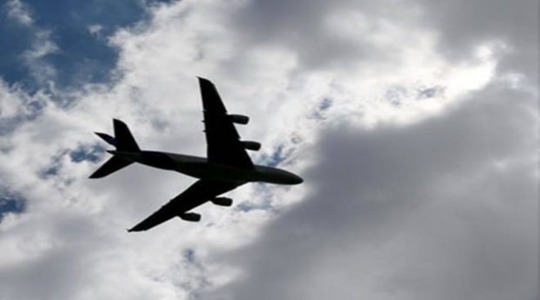
View On WordPress
#airline cargo sales#american airlines cargo#Ashok Rajan#Freightos Group companyWebcargo#IBS software Ipartner Customer#Ipartner solutions
0 notes
Text
Inside the battle to tame costly airline cancellations and delays
Inside the battle to tame costly airline cancellations and delays
A traveler wearing a protective mask views a smartphone while waiting for a flight at Dallas/Fort Worth International Airport (DFW) in Dallas, Texas.
Angus Mordant | Bloomberg | Getty Images
WARRENTON, Va. – During a morning meeting in early May, staff at the federal air traffic command center rattle off a few of the day’s obstacles: storms near the Florida coast and in Texas, a military…
View On WordPress
#Aerospace and defense industry#airline#Airlines#Alaska Air Group Inc#American Airlines Group Inc#battle#Breaking News: Business#business#business news#cancellations#costly#delays#Delta Air Lines Inc#JetBlue Airways Corp#life#Politics#Southwest Airlines Co#Spirit Airlines Inc#tame#Transportation#travel
0 notes
Text
BOYCOTTING FOR PALESTINE
The Official BDS Boycott Targets
The Updated List is Below:
EUROVISION. IT IS IN OUR TOP PRIORITY TO BOYCOTT EUROVISION
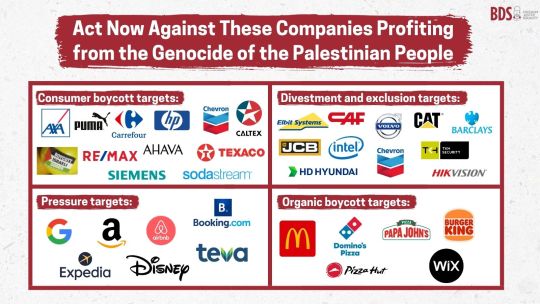
Consumer Boycotts - a complete boycott of these brands
Axa
Puma
Carrefour
HP
Cevron
Caltex
Israeli produce
Re/max
Ahava
Texaco
Siemens
Sodastream
Organic Boycott Targets - boycotts not initiated by BDS but still complete boycott of these brands
Macdonald's
Dominos
Papa Johns
Burger King
Pizza Hut
Wix
Divestments and exclusion - pressure governments, institutions, investment funds, city councils, etc. to exclude from procurement contracts and investments and to divest from these
Elbit Systems
CAF
Volvo
CAT
Barclays
JCB
intel
HD Hyundai
TKH Security
HikVision
Pressure - boycotts when reasonable alternatives exist, as well as lobbying, peaceful disruptions, and social media pressure.
Google
Amazon
AirBnb
Booking.Com
Expedia
Disney
Teva
Here are some companies that strongly support Israel (but are not Boycott targets). There is no ethical consumption under capitalism and boycotting is a political strategy - not a moral one. If you did try to boycott every supporter of Israel you would struggle to survive because every major company supports Israel (as a result of attempting to keep the US economy afloat), that being said, the ones that are being boycotted by masses and not already on the organic boycott list are coloured red.
5 Star Chocolate
7Days
7Up
Apple
Arsenal FC
ALDO
Arket
Axe
Accenture
Ariel
Adidas
ActionIQ
Aquafina
Amika
AccuWeather
Activia
Adobe
Aesop
Azrieli Group
American Eagle
Amway Corp
Axel Springer
American Airlines
American Express
Atlassian
AdeS
Aquarius
Ayataka
Audi
Barqs
Bain & Company
Bayer
Bank Leumi
Bank Hapoalim
BCG (Boston Consulting Group)
Biotherm
Bershka
Bloomberg
BMW
Boeing
Booz Allen Hamilton
Burberry
Bath & Body Works
Bosch
Bristol Myers Squibb
Capri Holdings
Costa
Carita Paris
CareTrust REIT
Caterpillar
Coach
Cappy
Caudalie
CeraVe
Check Point Software Technologies
Cerelac
Chanel
Chapman and Cutler
Channel
Cheerios
Cheetos
Chevron
Chips Ahoy!
Christina Aguilera
Citi Bank
Carrefour
Codral
Cosco
Canada Dry
Citi
Clal Insurance Enterprises
Clean & Clear
Clearblue
Clinique
Champion
Club Social
Coca Cola
Coffee Mate
Colgate
Comcast
Compass
Caesars
Conde Nast
Cooley LLP
Costco
Côte d’Or
Crest
CV Starr
CyberArk Software
Cytokinetics
Crayola
Cra Z Art
Daimler
Dr Pepper
Del Valle
Daim
Doctor Pepper
Dasani
Doritos
Daz
Dior
Dell
Deloitte
Delta Air Lines
Deutsche Bank
Deutsche Telekom
DHL Group
David Off
Disney
DLA Piper
Domestos
Domino’s
Douglas Elliman
Downy
Duane Morris LLP
Dreft Baby Detergent & Laundry Products
Dreyer’s Grand Ice Cream
eBay
Edelman
Eli Lilly
Evian
Empyrean
Ericsson
Endeavor
EPAM Systems
Estee Lauder
Elbit Systems
Expedia
EY
Forbes
Facebook
Fairlife
Fanta
First International Bank of Israel
Fiverr
Funyuns
Fuze
Fox News
Fritos
Fox Corp
Gatorade
Gamida Cell
GE
Glamglow
General Catalyst
General Motors
Georgia
Gold Peak
Genesys
Goldman Sachs
Grandma’s Cookies
Google
Garnier
Guess
Greenberg Traurig
Guerlain
Givenchy
H&M
Hadiklaim
Huggies
Hanes
HSBC
Head & Shoulders
Hersheys
Herbert Smith Freehills
Hewlett Packard
Hasbro
Hyundai
Henkel
Harel Insurance Investment & Financial Services
Hewlett Packard Enterprise
HubSpot
Huntsman Corp
IBM
Innocent
Insight Partners
Inditex Group
IT Cosmetics
Instacart
Intel
Intermedia
Interpublic Group
Instagram
ICL Group
Intuit
Jazwares
Jefferies
John Lewis
JP Morgan Chase
Jaguar
Johnson & Johnson
JPMorgan
Kenon Holdings
Kate Spade
Kirks’
Kinley Water
KKR
KFC
KKW Cosmetics
Kurkure
Keebler
Kolynos
Kaufland
Kevita
Knorr
KPMG
Lemonade
Lidl
Loblaws
Levi Strauss
Louis Vuitton
Life Water
Levi’s
Levi’s Strauss
LinkedIn
Land Rover
L’Oréal
Lego
Levissima
Live Nation Entertainment
Lufthansa
La Roche-Posay
Lipton
Major League Baseball
Manpower Group
Marriott
Marsh McLennan
Maison Francis Kurkdjian
Mastercard
Mattel
Minute Maid
Monster
Monki
Mainz FC
Mellow Yellow
Mountain Dew
Migdal Insurance
Marks & Spencer
Mirinda
McDermott Will & Emery
Motorola
McKinsey
Merck
Michael Kors
Mizrahi Tefahot Bank
Merck KGaA
Micheal Kors
Milkybar
Maybelline
Mount Franklin
Meta
MeUndies
Mattle
Microsoft
Munchies
Miranda
Morgan Lewis
Moroccanoil
Morgan Stanley
MRC
Nasdaq
Naughty Dog
Nivea
Next
NOS
Nabisco
Nutter Butter
No Frills
National Basketball Association
National Geographic
Nintendo
New Balance
Nutella
Newtons
NVIDIA
Netflix
Nescafe
Nestle
Nesquick
Nike
Nussbeisser
Oreo
Oral B
Old spice
Oysho
Omeprazole
Oceanspray
Opodo
P&G (Procter and Gamble)
Pampers
Pull & Bear
Pepsi
Pfizer
Popeyes
Parker Pens
Philadelphia Cream Cheese
Pizza Hut
Powerade
Purina
Phoenix Holdings
Propel
Ponds
Pure Leaf Green Tea
Power Action Wipes
PwC
Prada
Perry Ellis
Prada Eyewear
Pringles
Payoneer
Procter & Gamble
Purelife
Pureology
Quaker Oats
Reddit
Royal Bank of Canada
Ruffles
Revlon
Ralph Lauren
Ritz
Rolls Royce
Royal
S.Pellegrino
Sabra Hummus
Sabre
Sony
SAP
Simply
Smart Water
Sprite
Schwabe
Shell
Soda Stream
Siemens
StreamElements
Schweppes
Sunsilk
Signal
Skittles
Smart Food
Sobe
Smarties
Sephora
Sam’s Club
Superbus
Samsung
Sodastream
Sunkist
Scotiabank
Sour Patch Kids
Starbucks
Sadaf
Stride
Subway
Tang
Tate’s Bake Shop
The Body Shop
TEVA
Tesco
Twitch
The Ordinary
Tim Hortons
Tostitos
Timberland
Topo Chico
Tapestry
Tropicana
Tommy Hilfiger
Tommy Hilfiger Toiletries
Turbos
Tom Ford
Taco Bell
Triscuit
TUC
Twix
Tottenham Hotspurs
Twisties
Tripadvisor
Uber
Uber Eats
Urban Decay
Upfield
Unilever
Vicks
Victoria’s Secret
V8
Vaseline
Vitaminwater
Volkswagen
Volvo
Walmart
Wegmans
WhatsApp
Waitrose
Woolworths
Wheat Thins
Walkers
Warner Brothers
Warner Chilcot
Warner Music
Wells Fargo
Winston & Strawn
WingStreet
Wissotzky Tea
WWE
Wheel Washing Powder
Wrigley Company
YouTube
Yvel
Yum Brands
Ziyad
Zara
Zim Shipping
Ziff Davis
#free palestine#palestine#free gaza#israel#gaza#long post#from river to sea palestine will be free#palestinian lives matter#palestinian genocide#free free palestine#current events#fuck israel#anti zionisim#isntreal#defund israel#ceasefire#boycott israel#boycott divest sanction#boycott starbucks#boycott disney#boycott mcdonalds#boycotting#boycott divestment sanctions#my post#boycotts work
191 notes
·
View notes
Text
A queue is nothing more than a waiting line. Key word: waiting. Then why is it so hard for some people to wait their turn?
The word queue is French in origin, and it is also one of the most commonly misspelled words in English, right up there with etiquette and dessert (or is it desert?). It's a word more used by the Brits than by Americans, who say "in line" (or "on line," for New Yorkers). Some cultures are much more amenable to forming orderly lines than others (the ones who don't will not be mentioned here). But cutting into the queue or the line is frowned on everywhere.
So why is it that some people can't resist cutting in line? Is it possible that they have more of a sense of entitlement than others, and that what they have to do is more important than those who are waiting their turn. People who are waiting in line correctly almost always notice when anyone cuts in line (especially in this country, where it is truly frowned on), though they may be too polite to say anything. They may not be too polite to take a photo or a video of the miscreants, though, so if you are one of them, be aware that you might end up on YouTube or Facebook as a scofflaw.
Here are some tips that make standing in line easier for everyone:
• Queue early. If you hate standing in line, practice being early to events, especially those that you know will be crowded, such as Disneyland, a museum exhibition, or a movie premiere. And get to the airport a little before your airline advises.
• Wait your turn. Don't even think about cutting in line. You will leave a group of disgruntled, not to say angry, people behind you, and bad karma ahead of you. An exception here is if you know you will miss something very important, such as a airline connection, by waiting in line. In case of this kind of emergency, explain to people ahead of you in line what your problem is, and ask them if you can go ahead of them. Even better, contact an airline assistant and ask them to take you to the head of the line. They will do so if you will miss your connection otherwise.
• Offer your place in line to someone who needs it more. If you're standing in a grocery line with a full basket of purchases and the person behind you has just a few, offer to trade places! This is a simple act of kindness that costs nothing but a few minutes of your time. And whenever possible, offer to let older people, pregnant women, disabled people, and parents/caregivers with babies or young children go ahead of you.
• Children. If you suspect you will have to wait in line with your children, tell them ahead of time that will probably have to do so and that they will need to practice patience. It's never too early to teach children how to behave in public. But also bring something to keep them occupied, such as a book.
100 notes
·
View notes
Text

scopOphilic_documentary_729 - scopOphilic1997 presents never before seen photographs from September 11, 2001 shot on film.
8:46am - American Airlines flight 11 attacks North Tower of World Trade Center.
It was a warm, late summer morning in New York City. These images are in chronological order from that morning and afternoon (Greenwich ave/Christopher street, Canal street, & Houston st pier in the West Village/Soho.)
Some moments in life are permanently implanted into our brain. A group of close friends gathered that night as we speculated on whether this was our last night on earth.
This 9-11 series were the last photos I ever shot on film. All seven sets of photos in this series have never been shown until today.
#scopOphilic1997#scopOphilic#digitalart#NFT#nftart#streetart#graffiti#nyc#photographers on tumblr#original photographers#ArtistsOnTumblr#911#2001#Manhattan#WorldTradeCenter#attack#WestVillage#Soho#CanalStreet#WestSidePiersView#GreenwichAvenue#Tribeca#Film#35mm Film
70 notes
·
View notes
Text
part 1 -> part 2 -> part 3 -> part 4*
Borne back ceaselessly into the past

‿︵‿︵୨˚̣̣̣͙୧ - -୨˚̣̣̣͙୧‿︵‿︵
Chapter 4
Song:
After Dark
‿︵‿︵୨˚̣̣̣͙୧ - -୨˚̣̣̣͙୧‿︵‿︵
Outside of the agency, the sound of a helicopter coming down alerted everyone, and woke up Aeris. Yosano stood up as he sits up from the stiff bed, Jun’ichiro’s voice is heard from the hallway.
“You’ve all got to come see this!”
┏━━━✦❘༻༺❘✦━━━┓
TimeSkip
In the ADA
President's office
┗━━━✦❘༻༺❘✦━━━┛
“How nice to finally meet you! President Fukuna.” The blond male, Francis Scott Key Fitzgerald, smiles towards the president of the ADA, a silver briefcase in between them, to guild members standing respectfully behind the Guild’s leader.
“Uhhh… Fuzuka??”
“Fukuzawa,” His deep voice corrects the American’s mispronunciation of his name, his eyes closed and arms crossed.
“That’s it!” the blond points, “Oh! We parked our chopper on a nearby highway. Was that alright?”
“What is it you want to discuss,” The president stays in the same position, the only movement being of his mouth as he speaks, “You've journeyed across the world to come here, speak your mind.”
Tea is placed near the silver briefcase, “My~ this is a rare specimen,” Fitzgerald grabs the tea cup in his hand, eyes curious, eyebrow raised, “I don’t recognize this style of porcelain, what is the brand of this set? Royal Blanc?”
He lifts the cup above his face, looking at it bottom to top, top to bottom. “Or perhaps, El Zelga.”
Naomi, standing behind the president’s couch, responds. “It’s from the ceramics store next door,” Fitzgerald takes a sip of the tea, before handing it over to one of the characters standing behind him.
“My apologies.. Please call me Francis old sport, I insist,” he looks up, a mischievous smile on his lips, “I’m the leader of the guild, we are headquartered in North America! I personally own three conglomerates, five hotels, an airline, a university-”
“Mr.Fitzgerald,” Fukuzawa cuts him off, the blond leans back, a slight pout on his lips, “I’ve received reports that you issued a bounty to encourage the Port Mafia to attack us…” Fukuzawa looks up, a strong glare staring back at Fitzgerald, “Are they true?”
Fitzgerald smiles “Ye-es, that was a big mistake on my part.”
“To think such a famed criminal group would be so incompetent,” The blonde leans forward, crossing his arms across his knees, winking at Fukuzawa, "To make amends, I bring you a business proposal.”
Outside of the office, both Yosano and Aeris wait to be able to speak to the president, though being able to listen in to the serious conversation between the guild leader and the agency president. The voice of the foreigner cuts in “You’ve got a nice little company here, and it’s in an attractive neighborhood, as such…”
The sound of a briefcase getting opened registered through their ears as the guild leader speaks. “I’d like to buy it from you.”
Yosano frowned, looking at Aeris who seemed quite unbothered. The teen boy was fiddling around with his new clothing, he especially seemed to like the warmth of the tan sleeveless sweater vest that Ranpo got for him.
“It’s not the building I’m interested in,” Fitzgerald’s voice broke Yosano out of her trance, her re-relaxed face becoming tight with frustration, “I want one thing.”
“And that is?” The gruff voice of the president responds.
“What do you think? I want your gifted business permit.”
Yosano huffed, shaking her head as Aeris shuffled the bottom of his face getting covered with his red scarf. The boy knew a bit about the guild, not much, but he at least knew something. The guild wanting the gifted business permit wasn’t expected at all, but understandable.
“Those fools are about the only ones you can’t buy with money,” Aeris can hear the male lean back again, “We are a secret society that officially doesn’t even exist.”
The male pauses before continuing his speech, “there’s something in the city that we want, we’d rather not rile the ministry while we look for it. Your permit will allow us t-”
“I refuse,” The president cuts him off, the answer was to be expected for someone like him, but Yosano sighs in relief. Aeris stares at her from under his eyelashes, did she really think that the president of the armed detective agency would sell his permit?
‘Aren’t permits really hard to get?’ Aeris looks to the side, facing the door, his lips pouting from under his scarf as he huffs.
Listening back in, he slides down the wall and sits down, the amount of waiting is making him tired. He hasn’t been able to stand or walk, doctor’s orders, for a day or so, and that track meet from a few days ago is still making his legs wobble more than a plate of pudding being held by someone with Parkinson's disease.
“Very well then…” the soft sound of something being taken off and placed down was heard, “It’s a limited edition model, made to order with pink diamonds.” The man’s smile could be heard through the door.
“I’m afraid there’s no amount of money you could offer that would entice me to give up our permit,” Fukuzawa responds, “it is a symbol of hope, not just for our members but also for that of Master Natsume, without whom this agency would not exist.”
‘Master Natsume? That name sounds familiar… was it from the agency’s book. I remember reading something about him, but I’ll have to look for it for sure…’ Aeris sighs softly, ‘Can their conversation end soon? I’m getting tired of looking around at the same things on the wall, and taking the time to take the doctor’s appearance would be too weird…’ he looks up at the female, the metal butterfly hair pin taking his attention before he shook his head.
“What kid?” Yosano looks at him, her voice coming out soft but with a slight intent to scare. Her arms were folded and she was leaning back on the wall. She had been like that for a while.
“Oh, sorry… I just like your hair pin,” he points at the left side of his head, “it’s a great contrast compared to the rest of your clothing in my opinion.” The doctor smiles and nods, bringing her hand up to her pin.
‘It seems like she’s quite sentimental about it…’
“If your employees vanished, I’d make a bet your little agency would cease to function, and by then it would be too late to change your mind,” The American’s voice brough Aeris back to the serious conversation happening inside of the office.
Aeris stands up from the floor, cleaning the back of his pants off with one of his hands as he hears the closing of the briefcase. Kenji had been silently standing in the corner, Aeris hadn’t noticed that until a feminine voice cut through after two claps.
“Escort our guests out Kenji,” A smile appeared on the farmer boy’s face as he turned towards the door. “Understood!” the boy smiles as he opens the door.
“This way please!”
“I’ll leave a message for you in tomorrow's paper,” Aeris stares at the open door, the Americans coming to view from his spot in the hallway. He stands respectfully, not wanting to make a bad image of himself in the eyes of foreigners that have much more power than he does both economically and socially.
The taller blond turns his head, his blue eyes creepily becoming bigger as he smiles at the boss.
“Consider it carefully, you old sport. I always get what I’m after.”
Aeris glares at the floor before relaxing his face as Kenji and the guests walk past him. ‘Bad vibes coming from them, they’re going to do something not good at all…’
The girl with red hair, tied into two braids looks at him as he closes his eyes and bows his head down in respect. She huffs in pleasure before looking forward and walking away.
Yosano and Aeris wait a second, listening for the ‘Ding~’ of the elevator before breathing out a sigh and walking over to the entrance of the office.
Yosano knocks on the door as Aeris looks behind him again.
“Come on in,” The president’s voice sends a wave of comfort into Aeris’s body as Yosano opens the door and enters, the boy walking in right behind her before bowing towards the president of the agency.
“Yosano, and Dahl Aeris,” Fukuzawa nods, his face keeping a serious look to it, but his eyes changed instantly when they both entered.
“Please, sir, call me Aeris, I’m much more comfortable with that.”
“Yes, I thought so, Ranpo had told me about that.” Fukuzawa signs for the boy to sit down in front of him, “Please, sit boy, I apologize for making you both wait for so long.”
“It’s alright President,” Yosano stands behind Aeris.
There is a comfortable silence as Naomi comes by and sets some tea down in front of the young boy. “How are you feeling Aeris?” The older male asks, “You have been bedridden for a small while right?”
“Ah, umh, yes, I have. I’m feeling much better sir thanks to the close monitoring of Doctor Yosano, she’s been very polite to me and both Atsushi and Ranpo have been great company.” The boy nods before fully looking up, his natural droopy eyed look taking the president off guard. The black and pink haired boy had very mesmerizing though dull eyes, his smile being genuine but not reaching his eyes.
“I have a bad feeling of what is going to happen with the guild and us,” Aeris looks away, closing his eyes before looking at his reflection in the tea. Grabbing the cup, he takes a sip out of respect, straining to not make a face due to his small dislike to tea. He sets the tea down and smiles back at the President.
“Why is that boy?”
Changing the subject, the boy sits up straight. “I feel like Doctor Yosano has made a small explanation on my ability, and that Ranpo has deducted most of the information about my ability right?”
“Yes, they have. It’s called ‘Lamb to the Slaughter’, correct?”
Aeris nods.
“I believe it would be best if the Aeris joins the agency, his unique ability could help us a lot against the Port Mafia, and from what I can see, the Guild too,” Yosano speaks up, giving in a good word for the boy, “He also seems to know a lot about both of the groups, who knows what dirt we could get on them.”
Aeris’s eyes widened, seeing as the compliments of Yosano made him feel accomplished, maybe he could get a job here to finally be able to pay that nice landlord that let him stay in his parents house after the incident, and that nice lady that bought him groceries when he was too sad to go out, and a kid who would knock on his door with cards and games and his mom would come over to make sure he ate warm food and helped clean up his place.
The stinging of his eyes made him come back to reality as he looked up, avoiding crying in front of such a man. Would it consider him weak or too emotional to cry about people who helped him out when he was struggling?
The boy sighs before looking towards the president again, “I would love to join the agency, I would love to help this society be a safer place for the elderly, the middle aged, teens, and children alike.”
The president smiles at him before nodding, “It will take a while to officially join due to the amount of things happening at the moment, yes, I accept.”
Naomi smiles, Yosano places a hand on the boy's shoulder as he relaxes.
“Though,” Fukuzawa said, Aeris tensing up again. “You changed the topic when asked about the bad feeling you were talking about.”
Aeris sighs, closing his eyes. “Kenji was caught by the Guild.”
“What?”
“Yes, Lucy Montgomery, the girl with hair in braids. Her ability is called ‘Anne of Abyssal Red.’ Kenji was caught in her ability and is not able to get out, there’s no need to worry. I believe he is still safe.”
Fukuzawa huffs, “So it is starting.”
Aeris stands up, “I believe it is my time to leave, thank you for your time sir.” Bowing towards the older male, he straightens up and turns around, Yosano walking in front of him again.
‘I will do my best to keep this society safe, even if I have to break laws.’
#bsd fanfic#bsd x oc#bungou stray dogs#atsushi nakajima#bsd atsushi#bsd chuya#dazai osamu#bsd ranpo#bsd dazai#bsd oc#bsd chuuya#bungo stray dogs#bsd fandom#bungou stray dogs atsushi#fanfiction#fanfic#bsd jun'ichiro#bsd fukuzawa#fukuzawa yukichi#president fukuzawa#bungou stray dogs fukuzawa#bsd#f. scott fitzgerald#francis scott fitzgerald#bsd francis fitzgerald#fitzgerald bsd#bsd fukuchi#francis fitzgerald#bsd kenji#bungo stray dogs manga
20 notes
·
View notes
Text
No. 7 - A jetBlue FaMintly ReBluenion - The Quest for the Bluest Plane
And now, for something completely different.
We're done with jetBlue. I said that and I meant it. But we're not done with this train of thought. This post might not be what you expect. This is a very long post (and I do mean very long), a journey through the history of the US low-cost airline, the cognitive dissonance of the everyman millionaire, the thinly-veiled cynicism of the start-up airline, human kindness squeezed through cracks of a soulless machine which can never stop churning, and above all one man's quest to make the bluest planes he can, and my quest to tell you all if they look bad or not.
Let's begin here: have you ever wondered how new airlines are started? Well, when a wealthy individual or group of individuals love making money very much, they get together and incorporate a publicly traded company, lease a few airplanes, buy some airport slots...
I'll get to the point. Readers, there's somebody I'd like you to meet.

"Never speak to me or my daughter ever again."
image: Rick Maiman
This is David G. Neeleman. He's jetBlue's dad. And jetBlue...has siblings.
David Neeleman is a Brazilian-American-Cypriot businessman I would best describe as a serial airline founder. Normally the description 'serial entrepreneur', to me at least, implies flakiness and perpetual failure to get anything properly off the ground, but that's not the case for Neeleman. He's very successful. He's probably some sort of pioneer. I've seen him compared to Howard Hughes. There's really only one stain on his record, one failure to speak of, and it's been over ten years. He has a net worth of 400 million dollars.
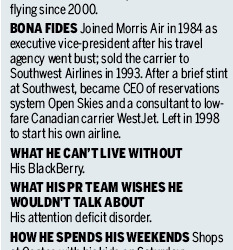
image: bloomberg
He's an...interesting person. Very interesting. He was born in Brazil and raised in Utah by a wealthy Mormon family. There are many very funny images of him available through Google. He has ten children, an ADHD diagnosis, no university degree, a whole lot of money, and a weird, weird, weird personal philosophy.
This interview is hard to sum up, but there's clearly a lot going on here. This is a guy who wants so desperately to be down to earth and kind and generous, who thinks he is down to earth and kind and generous, but who just can't take the extra step to realize the implications of the truly obscene wealth involved in venture capital and the inherent contradiction of that with his own ostensible charity and drive towards a fair and comfortable experience for passengers. In a way he seems like he's just too wealthy to really understand what being wealthy means. (It's also an older interview, and I imagine any scrap of genuine convictions he held through cognitive dissonance are now long-gone, given the CoViD thing.) He's also clearly got a chip on his shoulder about being fired from jetBlue. To be fair, having seen what they've done with their livery...I get it.
What else...he's also been CEO of airline booking program Open Skies, was involved with bizjet charter airline Superior Air Charter (then known as JetSuite), is founder and chairman of security company Vizgul for some reason, and is a minority owner of TAP Air Portugal. His nephew Zach Wilson is quarterback for the New York Jets. Oh, and he funded a study to underestimate the prevalence of CoViD. Classy, David. Real classy.
This isn't about David Neeleman. Not really. Not yet, at least. At some point it becomes about him, about his journey, but even then it isn't. When you have 400 million dollars you cease to become a meaningful subject as a person and become a meaningful subject as a distilled effigy of the things which the money came from. I dislike the Tony-Starkification of real people and I refuse to approach him in a way that supports that view of him. His life only matters to me in the context of the airlines he makes, and in what the way he changed over time represents. There's at least one biography out there for anyone particularly interested in the lives of Mormon multimillionaires who take issue with making people die less because they want the line to go up more. He is worth 400 million dollars, which is roughly a million dollars times what I make in one paycheck, delivered every two weeks. He's a creature in a suit who owns an absurd amount of wristwatches, each of which could pay for some sort of surgery for someone out there. There's a bunch of those in the world and this one happens to have made something which eclipses him, and that something is what's been occupying me since Wednesday.
If you're a book-reader - and I recommend being one - I think you're probably better off reading Barbara S. Peterson's "Blue Streak: Inside jetBlue, the Upstart That Rocked an Industry", which talks specifically about jetBlue and the way it pioneered what we now consider normal for aviation in the US. Reading it brought back memories for me of seeing adverts for jetBlue's planes on television, guaranteed to have a TV screen on every seat, and having my little mind which was still scarred by hours upon hours of complete boredom flying all the way from Tokyo to the American Northeast completely blown. Air travel really is unrecognizable from what it was when I was a child, although 20 years feels a lot shorter than it really is when you've lived it. There was no one factor that changed aviation so much in my lifetime, but there were a lot that contributed. ETOPS, 9/11, the recession, geopolitics, gas prices, the internet, legacy airline mega-mergers, privatization...and the jetBlue way of doing things.
It's easy to forget from our current vantage point but low-cost air travel wasn't always like this. Southwest did a lot to pioneer the modern low-cost model but jetBlue is probably the second-biggest player in the airline industry's shift to a culture which tries less to be glamorous and tries more to be fun and approachable (they by no means invented the Fun Airline, but PSA had been gone for 20 years at that point and the market had a gaping hole). They were a huge player in the rise of in-flight entertainment as standard even on low-cost flights. They helped keep aviation going after 9/11, when it was one of the few airlines to actually make money. And jetBlue's story isn't Neeleman's story, even though he founded it. I literally just listed four other major involvements of his, and he hasn't been involved in the business side of jetBlue since 2008. His story involves the founding of four - count em! - other airlines. Let's take a look through them and see if we can spot any patterns.
Morris Air (1992-1994)

sources and further reading: [1] [2] [3] [4] [5] [6] [7] [8] [9] [10] [11] [12] [13]
Never heard of Morris Air? Can't blame you. jetBlue's oldest sibling existed for two years in the 90s. Two years. That's pretty miserable. ValuJet was around for twice that. That said, you're actually probably more familiar with them under a different name: Southwest.
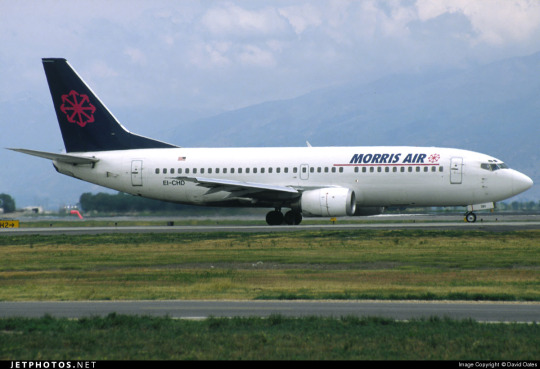
No, Morris Air did not become Southwest. Southwest existed at the time, and it was in fact Southwest which gave birth to Morris Air.
Morris Air was named for its founder, June Morris, who operated one of Utah's largest travel agencies. In 1984 she partnered with a then 25-year-old David Neeleman to launch Morris Air Service. The two had realized something that was about to shake the airline industry: plane tickets were really expensive, and you could charge even less than major budget carriers like Southwest by just buying all the seats on a charter flight and selling them on to customers at an attractively low price. If you did this, even regular working-class people trying to book a trip to Hawai'i or Disneyland could actually afford a plane ticket. This worked successfully, enough that Morris sold off her travel agency, until they incurred a large fine from the DoT for pushing too far and fraudulently passing themselves off as a scheduled airline (which mattered because commercial charters are operated under Part 135 regulations while scheduled services are governed by the much more restrictive Part 121). In response, girlboss queen June Morris and her investie David Neeleman went and started up Morris Air as an actual, genuine, fully certified part 121 carrier, making June Morris the only female jet airline CEO in the US. They operated a fleet of 21 737-300s around the west coast on both scheduled and charter flights, pioneering such cost-cutting measures as e-tickets (wrongly attributed to Southwest, they were actually first used by Morris). This fleet included N75356/N764MA/N697SW, the airframe involved in the TACA 110 incident, which was successfully landed on a levee after losing power in both engines.
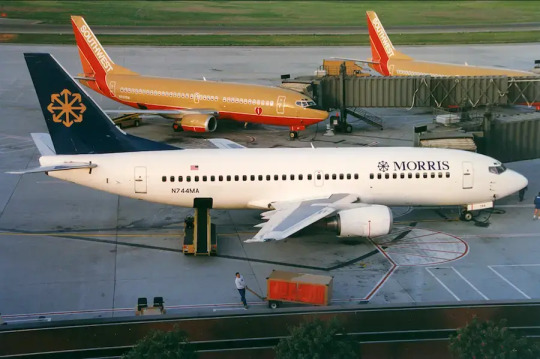
image: Richard Silagi
Now, I don't know about you, but these planes don't scream 'vacation' to me. In fact, they don't scream anything. They barely whisper. They breathe lightly on my ear. There are a couple planes in their fleet with weird features, like multicolor painted noses or cheatlines, but these seem to be one-offs and I wouldn't even be surprised if they were just leftovers from previous paintjobs (the one with the cheatline does look suspiciously like the one used on Sierra Pacific planes, one of the operators Morris chartered from). So they don't count. What counts is this.
Maybe if Morris Air didn't want to be instantly forgotten they shouldn't have made their planes completely generic. I'm not sure they cared, though. They wanted to make money and they made money.
A D- for Morris Air.
In 1992, less than two years after gaining its air operator's certificate, Morris Air merged with Southwest and the brand was retired. Despite having posed a legitimate threat to the titan that was Southwest at the peak of its relevance, it's since largely been forgotten. June Morris and David Neeleman both worked in Southwest's upper management for some time, but it was only five months before Neeleman left Southwest for other ventures. Soon, something more familiar would spring up, fed by the dying rays of Morris Air's gargantuan profits.
WestJet (est. 1994, began operation 1996)

Not exactly a deep cut, is it? WestJet is actually the second largest carrier in Canada and the ninth-largest in North America. They carry over 25 million passengers a year. I've never been one of them, but David Neeleman probably has, because he was one of the group of absurdly wealthy individuals who founded this incredibly successful airline in 1994.

WestJet operates a primary fleet of over 100 Boeing 737s of various models and seven Boeing 787s; in the past they also operated the 757 and 767. They operate both scheduled passenger and charter flights, as well as having a cargo division, a fully-owned regional subsidiary, and a Delta Connection/United Express-style brand name under which Pacific Coastal Airlines operates.

These all use more or less the same livery, which has only slightly changed since the beginning of operations in 1996. Pictured above is the original livery. I like the colors, I like the angularity on the tail, but I despise the style of livery with just the isolated tail colored in. This said, they introduced a new, updated livery in 2018.
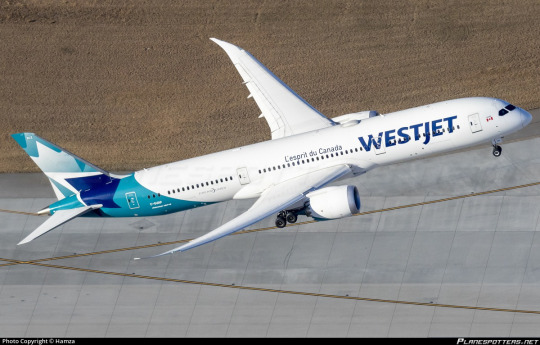
I am a very predictable person. Given a livery mostly seen on 737MAXes and Dreamliners, I will always pick the Dreamliner to use as a visual example. This is not a slight to the MAX. They are nice looking planes, but the Dreamliner's planform is just on another level. Look at that wing sweep. Immaculate.
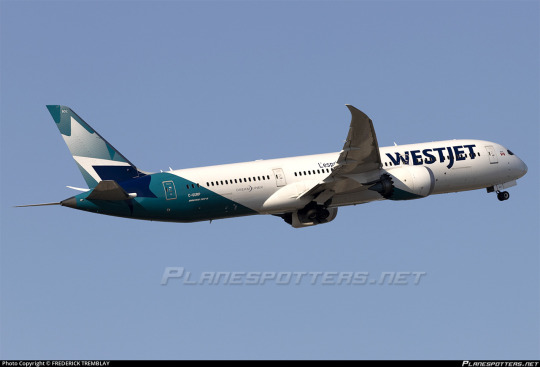
I like this color scheme a lot. I just happen to really like sea-green-adjacent colors, this is not the first time I've mentioned this. The font is nice, big, legible. I like the all-caps, I like the descender on the J. I think removing the logo mark on the wordmark and making it solid color was fine as a choice, makes the whole plane feel more balanced between the turquoise and the dark blue. The 'l'esprit du Canada' feels utterly pointless and is blocked by the wing and too small to be clearly read anyway. Tail design not limited to the tail, but mostly white fuselage regardless. Boring, but there's nothing here I can really call...bad? It's what they don't do that feels like the issue here, not what they do. Like, some sort of design on the nose and directly above or below, maybe? I didn't even realize there's any paint on the engines until I was editing my first draft and from most angles you just can't see it. Come on.
Grade: D+
Before I move on, there is something I have to mention. And that is WestJet's sub-brands. WestJet Encore is a fully-owned subsidiary which operates a respectable fleet of Bombardier Dash 8 Q400s, and WestJet Link is a brand name under which Pacific Coastal Airlines operates a couple Saab 340s. And that is...fine, normal, even, but...

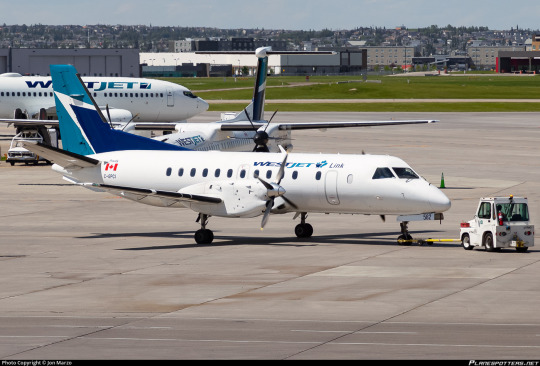
Is this a joke to you?!
Change your name to WestProp. Now.
...
Hey. Wait a minute.
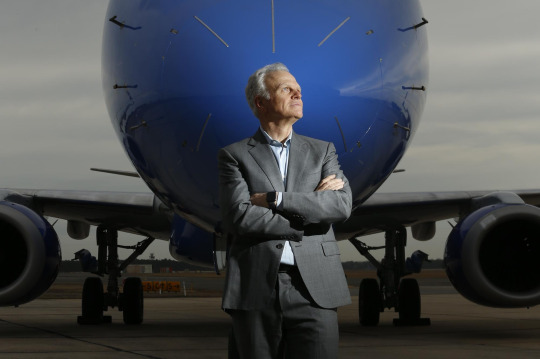
David! The large blue plane is coming! It has no engine power because it ran out of fuel and is about to hit you on the racetrack during family day! Oh no, he has airpods in! He can't hear us!
image: Cean W Orrett
This guy. David Neeleman. Yeah, him. We were talking about him. I mean, it's been a minute since he came up because as far as I can tell after founding WestJet he did nothing of note related to it again, but...what's he been doing? Wait...wait a minute. This is becoming a habit, David. All your airlines are...well...they share a certain trait, in a very specific area.
David knows what I'm talking about. After all, his next move, in 1998, was to found NewAir, which would shortly become jetBlue.
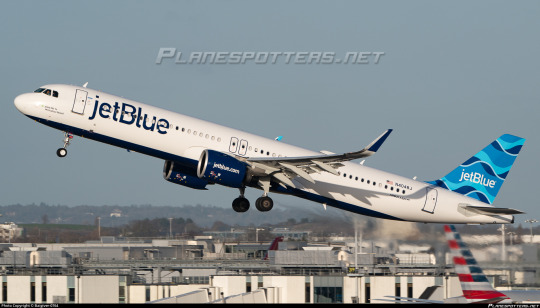
I have not stopped to count how many words I have written about jetBlue this week. It is a lot. I already delivered a verdict. We are moving on.
Because David didn't stop here. Why would he? It's 2008 and he just got fired from his own company because a winter storm went Southwest-holiday-scheduling levels of horrendous for the airline he raised from infancy. He's got time to kill and money to burn and he wants the line to go up, damn it! Well, maybe he can be in the right place at the right time again. Make a second jetBlue, win back what he's lost. After all, he's got something else up his sleeve - dual citizenship.

Just your regular average Mormon, lurking in forests with a model plane. Nothing sinister about that.
image: conde nast traveler
I did mention earlier he was born in Brazil, right? That's always been part of his life. When he was in charge, jetBlue was actually the launch customer for the Embraer E190, an incredibly popular mid-sized regional jet made by Brazilian manufacturer Embraer.
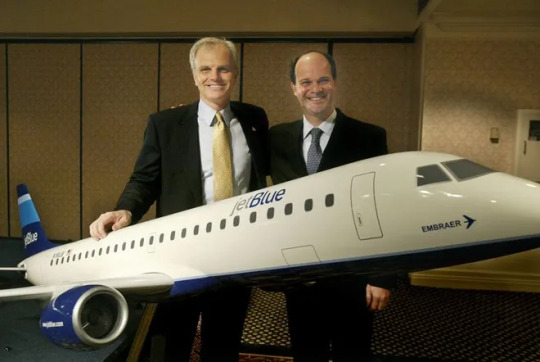
Is it just me, or do the men in this picture somehow look like cardboard cutouts holding a real airplane? There is something very strange about this image. I would go so far as to call it unsettling.
image: The Gainesville Sun
So, figuring he'd bled the US dry, I suppose, he moseyed on down to his birthplace with his millions of dollars and presumably a couple little blank model planes waiting to be painted and shown off at a press conference. If you've seen a pattern emerging, prepare to see it continue.
Azul Linhas Aéreas Brasileiras (est. 2008)
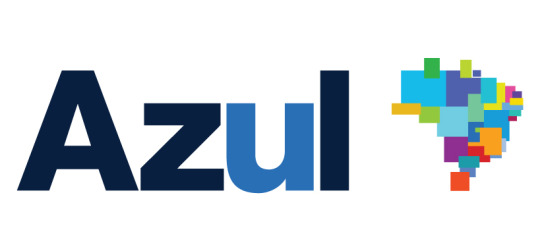
Mmm. Helvetica Neue Heavy. Not impressed.
Okay, sure. Technically there was a 'naming contest' and this name 'was the most popular'. But I think at this point I would believe that David Neeleman botted his own vote years before I would believe that Blue Airlines of Brazil just happened to be the winning name.
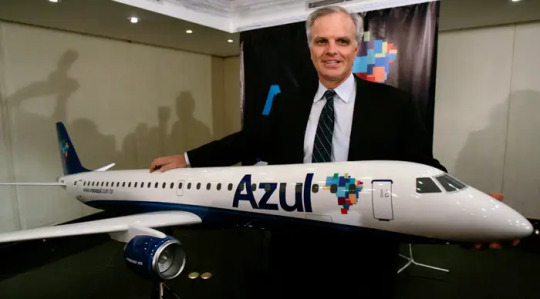
Okay, all else aside, I would really love to gently hold a plane like this. There's a certain caressing nature to the way he's holding this plane's snout which I crave to someday replicate with a similarly sized model aircraft.
image: Paulo Whitaker
Much like jetBlue, Azul began operating Embraer 190 and Embraer 195 aircraft before expanding its fleet to include Airbus models, a handful of ATR 72 tubroprops, and two Boeing 747s for cargo. They started with just five aircraft but grew rapidly, absorbing a bunch of other airlines and securing large investments from the likes of United and Hainan Airlines. Today they operate a fleet of over 150 planes to 161 destinations and are the third largest airline in Brazil. They have a set of crossover liveries with freaking Disney. (I might review those sometime.) They also have a crossover livery with John Deere for some reason. You know, the tractor company. In 2020 TripAdvisor named them the world's best airline.
In addition to the name of the company, they also name their airplanes. I do not speak Portuguese, but thankfully a close friend, @ametri-e, does. I asked him if the names were silly puns like jetBlue's are, and I got this response:
some of these are puns but not particularly funny, some of them just have the word blue in them, and one was funny
So there you have it!
Unlike Morris, which no longer exists; WestJet, which he seems to have minimally contributed to past its founding; and jetBlue, which tossed him unceremoniously on the tarmac with his bags, he remains the chairman of Azul at time of writing.
I find myself briefly wondering if this is all an attempt to recapture his lost glory. Is jetBlue, larger even than the impressive heights Azul has reached, the one that got away? Is he now forced to go forward modeling his work in the image of that which he was robbed of, that which he can never go back to?
I don't know and I don't care. I care about if the livery looks good or not.

Well, I wasn't just going to leave the John Deere plane out. It's a bit underwhelming, though, isn't it?.
So Azul is pretty different from jetBlue at first glance. Mainly, it uses a much darker blue and has a logo to go with the wordmark - a cute little pixel Brazil that looks a bit like a heart to me because of the specific way it's drawn. Everything is scaled nicely so it looks pleasing on the turboprop and I think the dark underside and the way it curves around the ventral fairing actually looks really good with the ATR's airframe, which has a very pronounced ventral fairing relative to similarly-sized props. But, okay, let's look at a jet.

This...is not terrible. I really like the highlights on the trailing edges of the winglets and the end of the rudder, and bordering the deep blue belly. Not crazy about the Helvetica Neue still. Why doesn't the 'u' being cyan carry over to the actual livery? Also, Detached Tail Syndrome. In fact, although it has features beyond this which make a further discussion worth having, the basic layout is what I call the 'Deltalike' because that's the airline I associate with it despite them certainly not being the first to use it - detached tail, painted engines, painted underside that's large enough to see from the sides. It avoids a lot of pitfalls of the other popular archetype, that of the very tail-heavy (which WestJet fell into), but has its own loathesome features. All said, though, I do think Azul is one of the better takes on the Deltalike.
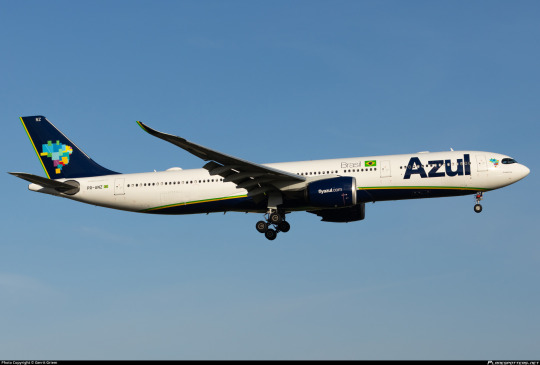
In the first picture the highlights look green, but in reality they're one line of green and one of yellow, for the Brazilian flag. I think they look really nice with this particular blue color, but I am exhausted of this man naming his airlines blue and then having the planes be majority white. They have such a nice shade of blue here, couldn't they make that the primary color of the body?
That aside, the way that the line curves up towards the middle of the plane combined with the tailing-edge highlights creates a sort of aerodynamic feeling. You even see them in other colors sometimes, like the pink ones on the E190s and blue ones on the E195.

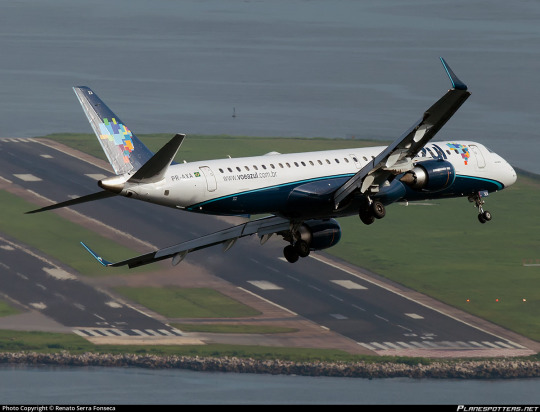

It also comes in pink! Were this not a one-off I would ask them to change their name to Rosa Linhas Aéreas Brasileiras, but it is a promotion.
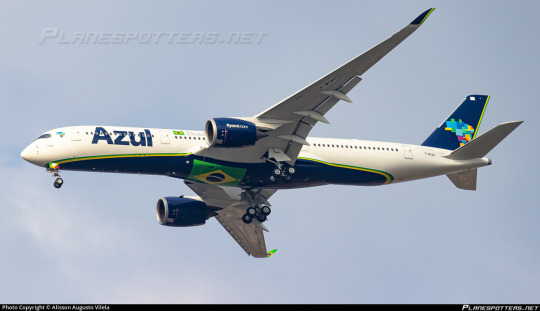
It seems like reconnecting with his origin has given David Neeleman the creative push he needed to beat jetBlue in at least one way - livery. All said, Azul Linhas Aéreas Brasileiras clocks in at a final grade of...
C+
Aww, not quite a B for Brazil. Better luck next time! Though I'll admit I considered putting it there for a bit. This is a very high C+. Still, no cigar. Next time try putting less white on the plane. If you're all about blue, why are all your planes still so white? Come on, David. You are spreading blue paint on every airline you've ever touched but never letting it get past the tailfin. Who are you kidding? You know you're holding yourself back. There's a desire deep in you. You know it's there. I know you want to. It's just a matter of when. You are going to give in to your most animal urges. This isn't enough for you.
You need a bluer plane.
You can feel the thirst for a plane blue enough that you might as well own a piece of the sky straining against the bonds you've tried so hard to impose on it all these years. When will you finally unleash it?
Breeze Airways (commenced operations 2021)

image: inc. usa
Here we are, David. Time has almost caught up to us. It's just you, me narrating, and a very, very blue plane indeed. We have finally reached jetBlue's youngest baby sibling.
"Together, we created Breeze as a new airline merging technology with kindness," David Neeleman said. "If you can just be nice, the people will be nice to you in return and your job will be more fun.”
This is an interesting pitch. When Cape Air, with its fleet of tiny airplanes and its founder who started the airline with himself as pilot just to fly one route that he found himself needing to travel regularly, makes their motto Make Our Customers Happy And Have A Good Time Doing It (Mocha Hagodti), it feels...well, it feels like the person who said that didn't understand yet what a company was. Cape Air is its own story with its own contradictions and the vicious cognitive dissonance of capital on stark display but you can sense the desire in its inception to provide a service before running a company. It is the opposite of cynical - it is naïve. It is hopeful and human and starry-eyed.
When a man on his fifth airline makes a pitch like that it's like trying to cloud-watch looking at the ceiling.
That's not the only pitch for Breeze. I mean, even if you've started four successful airlines already and it seems like everything you touch goes on to revolutionize some part of the industry I think that would be a hard sell to investors in 2021. There's a bit more going on here. I'm going to start with the bit that's boring and makes me roll my eyes.
Ever since JetBlue, Neeleman has, like the kid peering into the circus tent, longed to get back into the U.S. airline industry.
Bill Saporito writes for Inc. USA. I let out one tepid physical laugh. Yeah, David. You've got something great going in Brazil right now, but you want more. You want jetBlue and you can't have it. So instead...you give us an app.
The Breeze app is designed to eliminate chokepoints between passengers and planes. That means fewer people on the ground and lower cost.
Is this revolutionary? Is this destined to end in a Southwest-tier scheduling catastrophe? I'm not sure. I think David Neeleman's history suggests he could make this work, and I think the history of apps being used for things that didn't have apps before suggests that this could horribly blow up in his face. It seems to have gone fine so far, as I haven't heard anything else about it. To be fair, I wasn't exactly invested in the idea, so I haven't been looking. There's always time for some situation to happen nobody had foreseen and it all to go belly-up. Saying you never cancel flights works fine until a blizzard hits and then you have to start all over again, but he didn't build jetBlue by being afraid to take risks.
More interesting is the service they offer. Breeze has a bit of an identity crisis. Breeze wants to be an ultra low cost carrier with a first class cabin. That sounds contradictory because it is. The ULCC model as used by airlines like Ryanair and Spirit fundamentally relies on charging a low fare upfront with the expectation that customers will not receive a crumb extra without paying for it. Everything from seat reservations to snacks to anything else you can think of, you can pay extra for or you can do without. Breeze also follows other trends common with ULCCs, like a lack of seatback screens (the very thing jetBlue pioneered!) and flying point-to-point to smaller airports located outside of major metropolitan areas rather than routing through hubs. Yet Breeze insists it wants to have a first class cabin!
It does have a first class cabin, apparently. The classes are called Nice, Nicer, and Nicest. I wish airlines wouldn't do this. Air travel is the floorboards of stand-up comedy. Everyone already hates flying except weirdoes like me who spend enough time looking at pictures of airplanes to write reviews of their paint jobs, and even I get pretty tired of it if I go too long sitting there without the plane doing some sort of plane thing. You can be honest. You can call the classes Bearable, Unpleasant, and Painful. We all understand. It's okay. I would rather buy a ticket for Miserable But Cheap class than Nice. It probably won't actually be that bad, since Breeze doesn't do long-haul, which makes the presence of first-class even more bizarre. If you want first-class short-haul and have that sort of money just charter a private jet! And David Neeleman has been involved with at least two private jet charter companies too, so...what is he doing?
In 2011, almost exactly 10 years before Breeze began operation, Neeleman was interviewed for Business Jet Traveler. I linked the interview above. It's a powerful display of the cognitive dissonance of a man who considers himself a regular everyday Mormon dad, who donates his salary to his employees, who insists on calling his employees crewmembers, even as the line goes up, and up, and up. I've heard anecdotes about him sitting in the backs of his own planes at jetBlue, observing what he could change to make the experience better for the cabin crew and passengers, noticing a lot of those things could even save money, and I have no reason to disbelieve them.
As the head of a company he is by necessity exploiting those under him, as a businessman he is providing a service not from altruism but because he knows that people need it enough they'll give him money, and the more comfortable the experience for both the less likely he'll lose their labor and their money. Conscious or not, altruism is a means to an end, but it is still startling surrounded by airlines which don't even go that far. 'Nice' as a name for economy class is a pretty good summary of the man David Neeleman was, and the one he still tries to present himself as. But there's a specific question, and a specific answer, which I feel the need to place here.
The airlines have been cutting back on frills and first class, which is driving more people to business aviation. Do they need to find ways to treat their high-end customers better?
Well, JetBlue doesn't have first class. We treated everyone the same. Maybe it's funny I'm in the JetSuite market because it's so weird to me that on a plane with 150 seats, you give 12 people a great ride and you stick it to 138-squish them all back there because of 12 people. There's something about that that just feels wrong.
Does it still feel wrong, David? Did something change about you between the first million and the 400th? When did this transformation happen? Was it the Ship of Theseus effect? Or...was this what you inevitably were working towards all along? Was it a fool's errand to pretend that there is a difference between what you do and what you are? Aviation is not immune to the society which it is built to serve - it is shaped by it. It feels wrong for 12 people to have a nice ride while 138 are squished in the back, but if you think about the life that 5 million Americans live and the life the other 326 million have to live, all squished back there so the lucky few can have a nice ride, doesn't it feel a little less wrong? After all, you've got the reclining bed. You can just pull the curtain closed. You've probably known what you were all along.
The airlines are a tough business. Why start another after JetBlue?
Well, I've done this three times. It's what I know. I've always made money at it, always been successful. I figured out a formula that works and Brazil really needed it. And I had this idealistic view of trying to make a difference. I've got 3,000 people in Brazil that work for us and love their jobs and we flew four million people this year and a lot of those people had never flown before.
Air travel is life-changing. It's not just for those of us who stand outside airports and take a picture of every airplane we see. It is a faster, safer, easier way of getting people and things from one place to another. There are people who live in the remotest places in the world, who deal with mountains and oceans and even just being so far away from anywhere else. They can travel now, and they can do more than that. They can visit their family. They can get places even if they're somewhere railroads don't run to. Cargo planes bring these remote communities necessities. They take their children to university and its sick to lifesaving treatment. It's a lifeline and a fundamental part of infrastructure. Once we invented it we stopped being able to go back.
It isn't an inherently cynical thing to start an airline - not more cynical than starting any other company, anyway. At least, it shouldn't be. But I think it's an inherently cynical thing to start five. To have your position at Azul, which is both massively successful and your own brainchild, which you think is doing good...and to say to yourself "I need more. I need America. I need what I was robbed of when I lost jetBlue."
Very few people have ever started one airline successfully. David Neeleman started four and sat at the helm of Brazil's third-largest airline and decided it wasn't enough for him. He's always made low-cost airlines. To a not-insignificant degree he made the low-cost airline what it is today. But he needs a first-class cabin.
The Inc. piece on Breeze continues to discuss the airline's planned operations. In 2011 Neeleman's employees were crewmembers.
Breeze is also introducing a program in which it will hire college interns from Utah Valley University and mold them into customer-service machines. In exchange for salary, free tuition, and housing, the students will undergo training and then work 15 or so days a month while taking their college courses online. "The big thing is we are going to provide a great service with kind people on a beautiful airplane with a fun atmosphere," says DePastino.
In 2021 they are customer-service machines. They will spend not just their days but their nights in Breeze's living spaces at one of the most vulnerable times in a person's life, learning how to be cogs in a machine right when they're transitioning from being students to entering the turbulent world of trying to find a job. And all of us want a job that makes us feel like we're still us, doing something that makes the world better and that helps us touch the tip of Maslow's pyramid. Almost none of us get it. Most of us slog through something utterly pointless that is entirely separate from our own self-identity to just keep our heads above water. Breeze turns this into a machine and it starts its cogs young.
Would I take this deal if it was offered to me? I'm a university student with barely enough money to keep myself afloat in a very expensive city while paying for university and for medicine and for anything else that may suddenly come up. I love aviation. I have customer service experience. I work in customer service right now and will probably continue to for a long time. I would hypothetically be an ideal candidate for this sort of program. Would I take this offer knowing that nobody, myself included, says to themself as a child that they want to be an airline customer service representative when they grow up? College is supposed to be the place you lay the groundwork for trying to start a career. Nobody wants their career to be 'customer service representative'. Nobody wants their obituary to say 'beloved son, husband, middle management at an airline's call center'. Sure, lots of people end up there, and plenty of them are happy and fulfilled and they have nothing to be ashamed of, but nobody's 18, going into college, and thinks that's what they want to live and breathe for years. They want to intern in the accounting departments, to shadow engineers, to see the sleek jets and peer in on the lifestyles of the people who built this. They want to be David Neeleman. But that's not an option for most of us.
So what would I do? Live this concession to the inevitability of automation which overtakes much more than the flight deck? I might, because at least it's a guarantee of shelter and stability that I don't have trying to stumble my way through an utterly shambolic job market caught between the price of school and the need to earn that money and the costs inherent to autoimmune disease and the number of hours there are in a week. I want to write, or even just to do something that involves words, because even a data entry job might let me pretend I'm still the person I thought I would grow up to be, and even that seems off the table. But it's one thing to know your dreams are never going to be realistic and another to say it out loud and yet another to commit to it in a place that even refers to you outright as a machine as if they don't understand the weight of that word when you provide someone's lodging and pay and everything else they rely on. This is a few steps short of being a company town populated exclusively by the young and vulnerable who think they're going to be entrepreneurs one day.
"When I started JetBlue, it was a customer service company that just happened to fly airplanes," Neeleman says. "Breeze is a technology company that just happens to fly airplanes."
He was talking about the app when he said this, but I think it comes through in a broader sense. jetBlue was a customer service company. Humans interfaced with humans. The idea was in nature lively, giving names to inanimate flying machines. It was a corporation, it made money, it did not actually care about people and it could not because it was not itself human, but it did not wear this fact proudly. It was a regrettable necessity of running an airline, and the CEO donated his salary to the employees. jetBlue under Neeleman and beyond clung to the human element, and to kindness and to making low-cost flight fun and comfortable even though there was nobody on the plane with a first-class ticket. You might be part of a fundamentally unethical system known for cutting corners and lying and sweetheart deals and never suffering consequences when something as simple as a jackscrew nobody lubricated kills 88 people, but you're going to at least try to dampen that impact. It might kill you just as dead but it can hurt less, maybe so much you never realize jetBlue occupies the same slice of the world as Pan Am and as ValuJet.
Breeze Airways lodges young individuals and molds them into machines. It is an ultra-low-cost carrier with a first class cabin. It presents a scenario where people are optimally herded by an app, served by employees who go home at night to the same place they work, and all of it can be reduced down to numbers so easily. It takes the human and it makes it technology. It makes it profit. The human element is gone. It doesn't matter how much it hurts you because if you aren't a person there's nothing to kill. It says the quiet parts out loud and makes you get on the phone and tell your family you're happy here with a gun to your head. It is a machine built of anonymized mannequins who, irrelevant to their role in it, happen to be alive, and it calmly tells you that this is a good thing, and that is a threat. The lowest category of experience you can have is 'nice'. Breeze Airways does not name their planes.
When I was a child I thought airlines were people and airplanes. I've flown many times in my life. There aren't many other ways to get from Japan to the East Coast these days. The world is huge but we can see it all so easily, assuming taking us there can make someone money. I remember being eight and having the pilot standing by the door to greet passengers, having him hand me a little pair of plastic pilot wings I still have now. I remember the stormy night I flew alone for the first time and the stewardess who let me sit next to her for a little bit and answered all my questions about the noises the plane was making. I remember the first time I flew on a propeller plane and the pilot who explained to me what all the gauges meant, and who insisted there was nothing to be afraid of and pointed out all the landmarks we flew past, who clearly knew this route by heart.
That's not what aviation always is. That's not what it usually is. People don't usually start airlines because they wish they could fly everyone around in their little single-engine plane on a commuter route from Boston to Provincetown, from Hyannis to Nantucket, provide that service to the people who don't have a plane and a license of their own, but they just can't do it all themselves. People who start airlines aren't usually intrepid pilots searching for new heights to push themselves to or flight instructors looking to fly people around in a single rented DC-3. They're businessmen. They want money. Juan Trippe was a businessman. Howard Hughes was a businessman.
The corporation is where passion goes to die if it existed to begin with. They build machines to suck the life out of pilots, exhaust them, put them in planes that are falling apart and let them take the blame when they fail to do things they failed to teach them. These people aren't your friends and they don't care about aviation, and if they do it's in the way an American child plays soldiers at the same time a school in Syria is being bombed. They're usually not even pilots. They're people with a lot of money who want even more money. jetBlue isn't unique in that sense and neither is Breeze. One just says it a lot louder.
Sometimes an airline is a technology company that happens to fly airplanes. That's true. Every single positive experience you have is with people, not airlines. I've never once spoken to jetBlue, just a matrix of pilots and flight attendants and customer service representatives who make up its many limbs. Maybe it should come as a relief, a sort of coming clean, that Breeze is tearing back the curtain and reminding you that the time a stewardess calmed you down during turbulence isn't really any different from the time a drugstore cashier let you off even though you were a few cents short of your total and said they'd take care of it. It's not CVS doing that. It's always people.
So many businessmen say they're here to do good, to make the world a better place, to reconcile kindness with venture capital. Any of them could build a tower that reaches all the way to the edge of the solar system and let us all know how many beautiful things there are that we can reach if they can find a profitable way to get us out there, and yet it's still the people who see your transit card is out of money and scan you in using theirs that make me remember that we are capable of kindness despite our surroundings. It is up to all of us whether we wish to be kind or not and it's not something anyone else can build for us.
Companies can't build a kinder, softer, funner, more human place. They can make money. They can provide a service. A service you need, at a cost you can afford, predicated on the fundamental question: whether they think you can make them money. Desperation, need, giving people a non-choice, that's how you make money and kill criticism. That isn't kindness. That's finding a gap in the market. Always has been.
I read that at JetBlue, you also didn't have your own parking spot and you donated your entire salary to a crewmember crisis fund, saying, "It seemed hoggish of me to have all this stuff when others didn't because every time I would get something someone else would have less." Yet then I read about your $14 million mansion in Connecticut.
It's my wife's mansion. I never would have built that, ever. I think she's repentant. It was a project for her and it kind of got out of hand. But we all felt funny moving in. That's why we want to sell it.
I'd wondered how you reconciled the mansion with your philosophy.
I don't.

image: Bill Bernstein
Okay, Marx or Megatron or whoever you think you are, that's enough of that depressing schlock. You are a tumblr.com airline livery review blog. We're here to answer if the plane looks good or not.
It's not like Neeleman's only goals are money and vapid personal satisfaction. We've been with him from the start. It was just an unacknowledged bit of the tail. He probably didn't notice it at first, but we did, with the gift of hindsight. It germinated. It took root. It grew. It became identity. It became his white whale. Are the planes blue, though?

Well, everyone, meet N206BZ. She's an Airbus A220-300. She's just a year and a half old and was delivered brand-new to Breeze Airways. She doesn't have a name, just a registration, but that's sure one blue plane if I've ever seen one!
The color scheme is visually pleasing. It's all over but it keeps visual interest with the darker tail and rear fuselage, the darker engines, the big white check-mark that serves as an instantly recognizable emblem for the airline. The repetition of it on the winglets is a nice touch.
I hate the wordmark, honestly. The text feels like it's located too low, the lightest blue blends in with the main fuselage until it borders on illegible. As far as I can tell, the typeface is custom. I hate it. It's ugly. The text is bad and it weighs down the rest of the plane.

A lot of how a livery looks depends on the lighting. So let's look at another example. I'd like to introduce you to N140BZ. She's an Embraer E195-200 and she's coming up on 15 but she hasn't slowed down any. She flew for Air Europa for a long time, but from 2016 on she was in limbo, all sorts of holding groups leasing her to each other but nobody putting her into service. Now she's with Breeze. They'll retire their E190s somewhat soon, but for the moment they like to have them. It allows them to operate shorter routes and free up time for charters on other days, just to maximize productivity. She doesn't have a name either. I'd say she still looks pretty blue. A lot of the concept art has a very metallic and reflective feel which I'm glad isn't as present in the actual planes, because it looked a bit sci-fi movie and not in a campy way. It was very blue chalk marker.
I like these colors just as much in this sort of washed-out environment as I do in direct sunlight gleaming at full intensity. Maybe more, even, since the text of the wordmark is so much more legible now and you can even see that the checkmark itself is blue. There's almost nothing on this plane that isn't blue. The only thing not blue about this airplane is that she doesn't have a name to revel in it.
The Breeze livery gets a B-.
It is a competently executed version of the thing it wants to be. There's visual interest. There are choices made. It's more than a logo slapped on a tail and sent off to sit on the tarmac with hundreds of other primarily white airplanes. I like it, I think this is the best Neeleman livery. It's also the bluest.
I find myself thinking the checkmark is an apt logo. Azul wore the shape of Brazil - a country full of people. Azul Linhas Aéreas Brasileiras S/A is a company. It cannot have a soul. But its founder says it does. He wants to make something better for people. Breeze Airways is a checkmark. It satisfies a need. It is 'nice' but there is no pretense that it is people.
The pilots will be kind all the same, and the stewardesses. People will agree to swap seats so families aren't separated. People will compliment strangers' outfits and help the person in line in front of them who's fifty cents short for a bottle of water. We will hold the door for elderly men with canes and exhausted women with strollers. We will take every little chance we can to be kind. We do this because we are people, and not because of where we work, and it's definitely not the people with 400 million dollars to put down on a shiny new airline making that happen. Everything is scheduled through an app, minimizing contact with humans even as the ones we do talk to are 'molded into customer-service machines' over the course of years. N140BZ wears her blue colors well, and not having a name doesn't make her any uglier. So what is it that's changed?
David Neeleman can't make jetBlue a second time. But he doesn't know that. To a man with so much, maybe it makes sense how he could fail to realize that. When you're high enough in the air a thriving uptown and an area of condemned slums look more or less the same, just little blocks of color all the way down there. He doesn't even realize he's given up the ghost. This is only a tragedy if your definition of a happy ending was us believing someone is better than they are instead of being left no room to continue failing to recognize what money is and what money does. The corporation wears two masks - the mask that it wears when it is a corporation wearing a mask, and the mask it wears when it is so close to human that you mistake it for your friend. The businessman wears these masks too. To be sad they've taken them off is to invest more in the virtue of these men than they ever do in the life or death of the 138 people squeezed in the back.
There it is. Two decades, five attempts, the bluest plane. If you've kept reading all the way to the end let me know in the replies what your favorite Neeleman-proximate livery is. I'll see you all tomorrow for our regularly scheduled Runway Runway livery review, and I hope you all have a wonderful night.
#tarmac fashion week#grade: c+#grade: b-#grade: d-#grade: d+#neelemanverse#region: north america#region: latin america#region: united states#region: canada#region: brazil#era: 1990s#era: 2000s#era: 2010s#era: 2020s#azul linhas aéreas#westjet#morris air#breeze airways#runwayrunway blueses it#compilations#long haul#charter airlines#leisure airlines#low cost carriers#ultra low cost carriers#defunct airlines#lufthansa declined#deltalike
79 notes
·
View notes
Text
American Airlines pilots approved a sweetened labor deal, making the carrier the second major U.S. airline to seal a new contract with its highest-paid work group.
The more than 15,000 pilots at American will get immediate raises of 21% with compensation rising more than 46% over the duration of the four-year contract, including 401k contributions, their union said Monday.
[Read the rest]
48 notes
·
View notes